Our Approach
Rethinking specifications.
Refocusing Priorities.
Closing The Gaps
Traditional approaches to construction specifications focus on a relatively narrow deliverable: a set of documents to help define contractual obligations and guide builders in their work. The Conspectus approach, by contrast, creates and documents a seamless flow of information that extends from the concept phase — well before design begins — through design and construction to owner occupancy and operations.
Uniformat
Uniformat describes a project in terms of the systems and assemblies that perform critical functions — substructure, shell, interiors, and services for example — enabling exploration and assessment of the cost and functionality of design options early in a project.
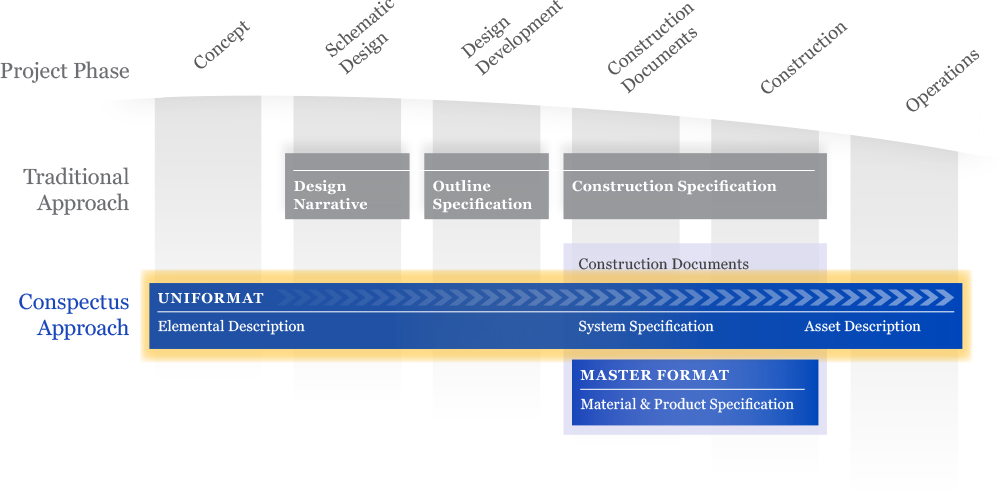
MasterFormat
MasterFormat organizes data about construction requirements, products, and activities by “work results” and enables communication among designers, specifiers, contractors, and suppliers as they work to meet owner’s requirements, timelines, and budgets.
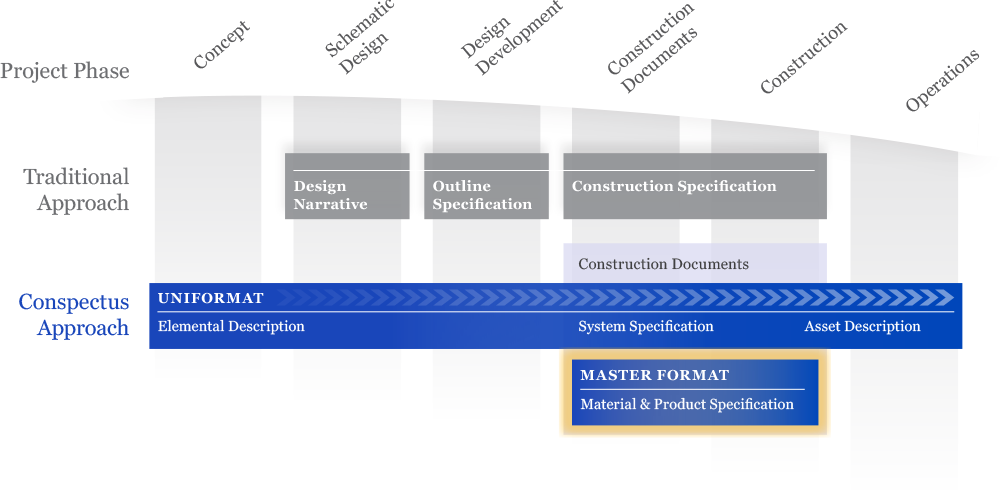
Design Narrative
The design narrative tells the story of how a particular design will meet the owner’s requirements. It describes a building’s purpose and functionality, often offering insight about finishes, materials, and systems that will be required.
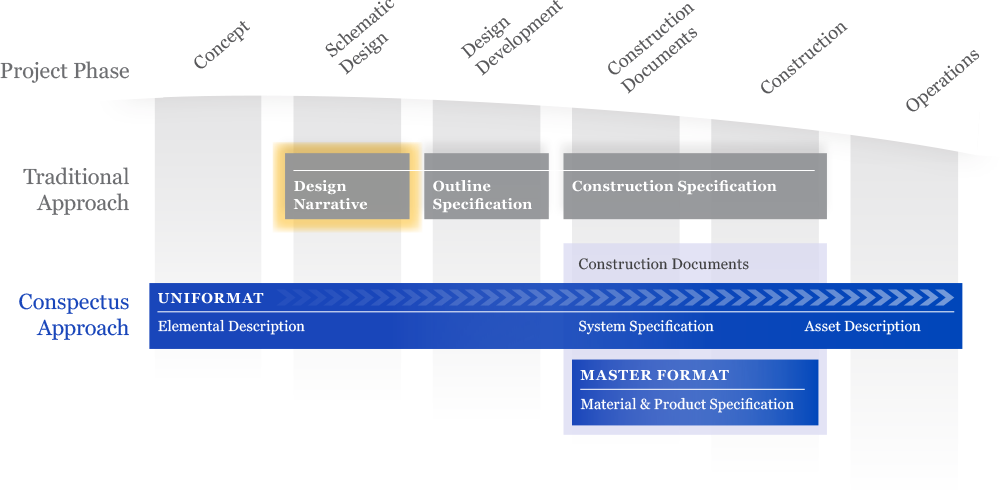
Outline Specification
An outline specification is an itemized list, using brief, concise statements, of significant materials, systems, and equipment and their criteria and levels of quality.
(Source: AIA and CSI)
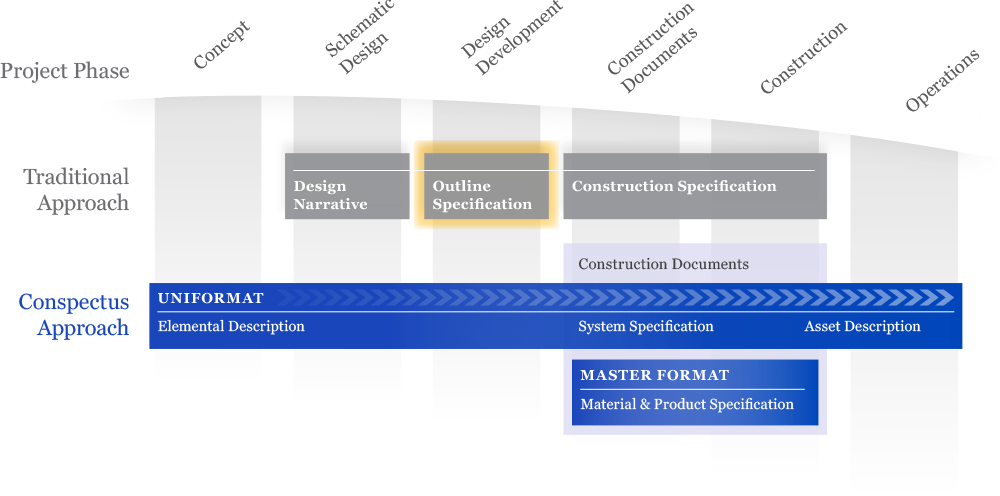
Construction Specification
A part of the contract documents, construction specifications consist of “the written requirements for materials, equipment, systems, standards, and workmanship for the work and performance of related services.”
(Source: AIA)
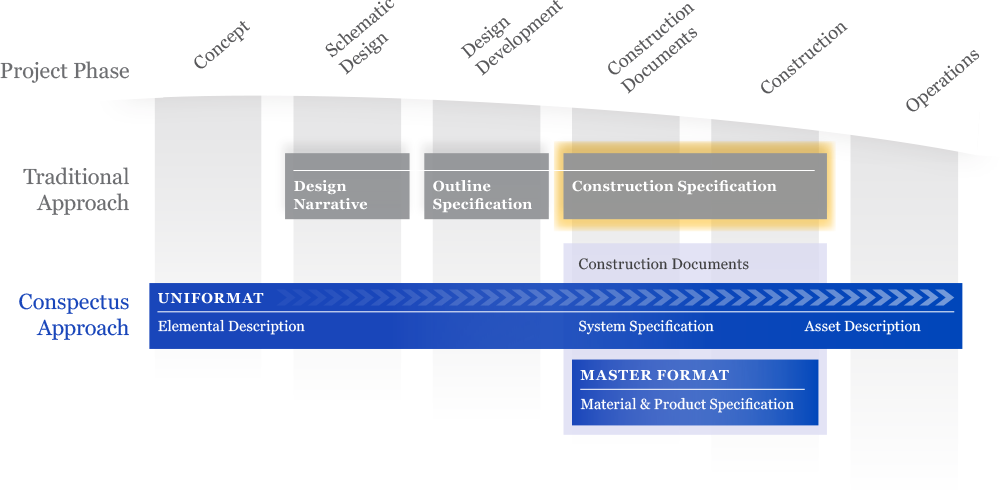
Closing the Gaps
The disjointed traditional process approach is riddled with risk-prone information gaps. The Conspectus approach, a seamless continuum of documentation, closes these gaps. The following are the gaps with greatest risk.
(Source: AIA)
.png?width=1000&height=496&name=approachSlider_09%20(1).png)
Design Process Gaps
Without a continuously updated record of the who, what, and why of design decisions, the design documentation becomes obsolete and disjointed. As a result, the team often duplicates effort and revisits decisions already made.
(Source: AIA)
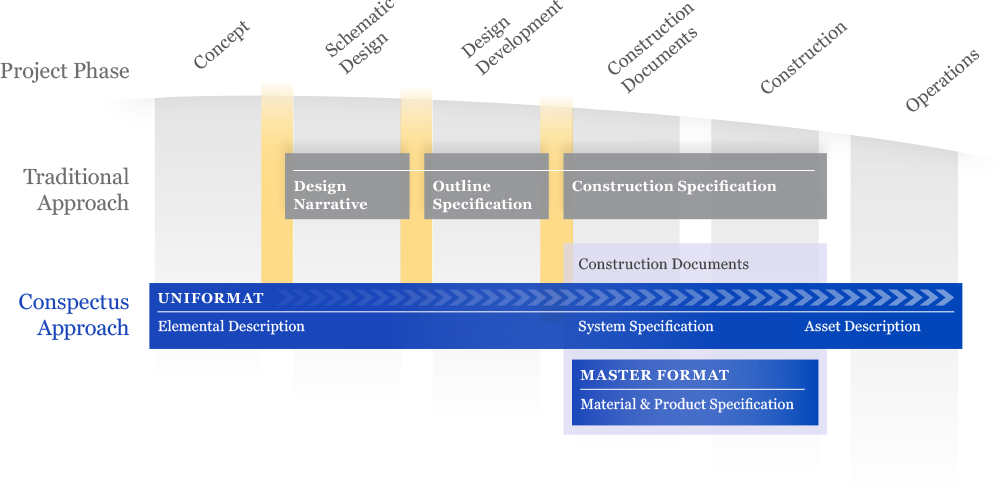
Documentation Gaps
Serious information gaps result when outline specs differ from the design narrative and construction specs can differ from outline specs with no record of the rationale for the differences. This can result in scope and cost creep, value engineering, and continuous cost escalation.
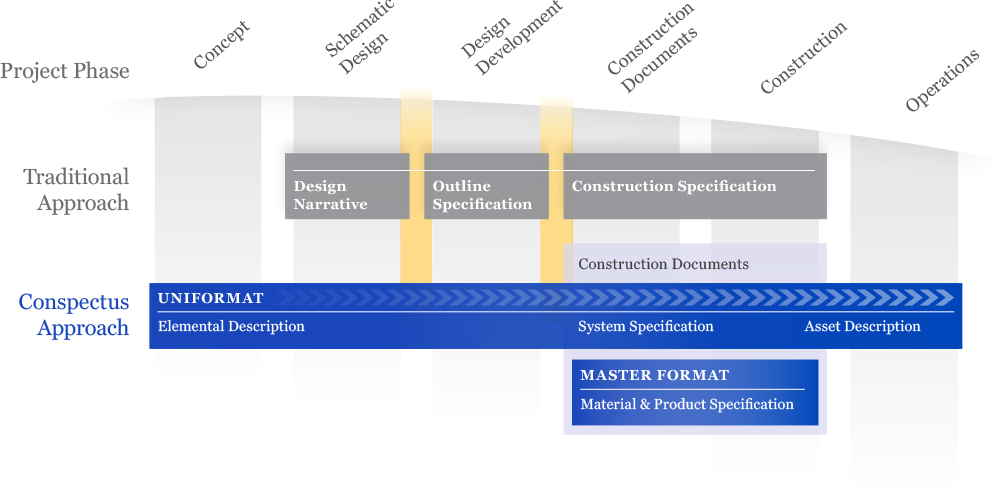
Owner Operations Gaps
An owner’s ability to manage and maintain a completed building efficiently can be seriously compromised when errors or disconnects in documentation, which can occur at any project phase, result in incomplete or inaccurate design data, performance data, construction records, and operating information.
.png?width=1000&height=496&name=approachSlider_09%20(1).png)
Construction Specifications and Documentation
Our Solution
Making this dynamic information resource accessible to all stakeholders — owners, architects, design-builders, and construction managers — gives them a clear, consistent, and continuously updated understanding of the impact of design decisions and enables them to contribute to the decision-making process.
This transparent, collaborative approach results in more fully informed decisions during design and construction and provides critical guidance to owners for operating and maintaining their assets.

Designed for You
What the Conspectus Approach Can Mean for You
Our rethinking and refocusing of the specifications process makes good business sense for all stakeholders. As projects evolve, the Conspectus approach captures and preserves increasingly complex information, provides data for incremental cost analysis of proposed design and construction options, and documents all decisions as they are made.
The Benefits
Why the Conspectus Approach Works
Focused on Owner's Requirements
The Conspectus approach creates an information flow that supports optimized design choices, translates design solutions into reliable construction documents, and provides the data and insight necessary for owners to optimize the operations and maintenance of their facilities.
Reduces Inconsistencies, Discrepancies, Redundancies, and in-efficiency
The Conspectus approach gathers comprehensive data from the earliest phases of a project ensuring that no data is lost and that all relevant information and decisions are documented. This helps to reduce both the number and frequency of change orders and to avoid disruptions caused by value engineering efforts to cut costs, regardless of scope or quality implications. It also provides complete documentation for dispute resolution.
Mitigate Financial Risk
Because financial risk is always top of mind, Conspectus carefully defines the required systems and assemblies in sufficient detail to enable early cost analysis of the viable options. This promotes fully informed design decision making taking into account the three most critical dimensions: performance, cost, and quality.
Support Fully Informed Decision Making
Owners and architects can start making data-driven decisions earlier in the project and at a higher level, which helps keep the design solution aligned with owner requirements. With access and input to centralized, accurate information at every stage of the project, all team members can understand the “what and why” of design solutions and align their efforts with the desired outcome.
Embodies Transparency and promotes Collaboration
The Conspectus approach keeps the extended project team on the same page by providing access to a common, complete, and current data set. This enables team members to make fact-based decisions rather than rely on assumptions and best guesses. It also provides a mechanism for all parties to contribute relevant knowledge, expertise, and experience at the most appropriate time in the project continuum.
1 min read
AI at Conspectus: Actual Intelligence at Work
May 29, 2025 by David Stutzman
1 min read
The Contract Mistake That's Actually Killing Collaboration.
May 27, 2025 by David Stutzman


